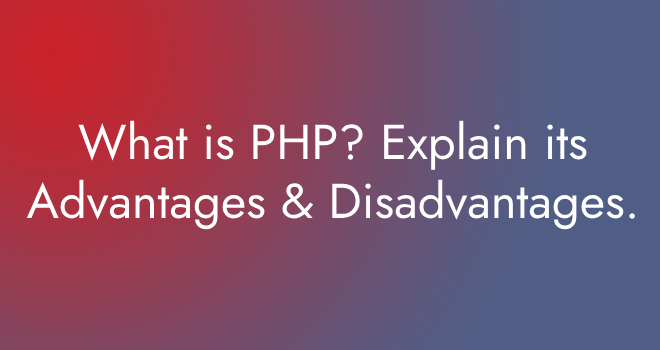What is PHP?
PHP is a server scripting language, This is used as a powerful tool for making dynamic and interactive Web pages.
PHP is a widely-used, accessible, and efficient alternative to competitors like Microsoft’s ASP.
PHP (Hypertext Preprocessor) is a popular open-source scripting language. It is widely used for web development.
It was originally created by Rasmus Lerdorf in 1994.
PHP evolved into a powerful server-side scripting language. PHP is designed to be simple and easy to learn, which makes it an ideal language for beginners to start with.
Some of the key features of PHP include:
- Cross-platform compatibility: PHP runs on multiple platforms such as Windows, Linux, Unix, and macOS.
- Server-side scripting: PHP code is executed on the server side, which means that the client (user’s browser) only receives the output of the code.
- Open source: PHP is free to use, modify, and distribute.
- Large community: PHP has a vast community of developers who contribute to its growth and development.
- Support for databases: PHP supports a wide range of databases, including MySQL, PostgreSQL, Oracle, and Microsoft SQL Server.
- Easy to integrate with other technologies: PHP can be easily integrated with other technologies such as HTML, CSS, JavaScript, and XML.
PHP is commonly used to build dynamic web applications, such as content management systems, e-commerce websites & social networking sites. PHP can also be used for command-line scripting and creating desktop applications.
Advantages of PHP:
- Easy to learn and use: PHP is a simple and easy-to-learn language, especially for those who are familiar with programming concepts.
- Open source: Being an open-source language, PHP has a vast community of developers who contribute to its development and maintenance, ensuring that the language remains up-to-date and secure.
- Platform independent: PHP runs on multiple platforms, including Windows, Linux, Unix, and macOS, making it an ideal language for developing web applications that can run on various platforms.
- Fast and efficient: PHP is a fast and efficient language, especially when used in conjunction with a web server like Apache.
- Large community and documentation: PHP has a large community of developers who have created a wide range of resources and documentation, making it easier for developers to find help and information.
Disadvantages of PHP:
- Security: As with any popular language, PHP is vulnerable to security issues if not coded correctly, which can lead to vulnerabilities and attacks.
- Inconsistencies: PHP has some inconsistencies in its design and syntax, which can make it harder for developers to learn and use effectively.
- Scalability: While PHP is great for building small to medium-sized web applications, it may not be the best choice for large-scale applications that require a lot of processing power and resources.
- Performance: While PHP is fast and efficient, it may not be as performant as some other languages, particularly for applications that require a lot of processing or complex operations.
- Lack of modern features: While PHP has evolved significantly over the years, some developers may find that it lacks some modern features and programming paradigms that are available in other languages.

